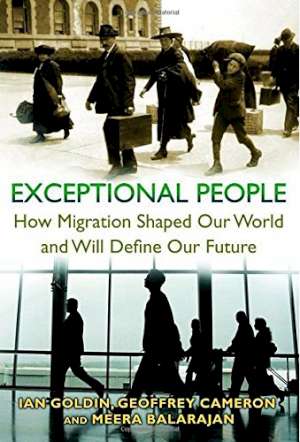04 July 2012
Exceptional People
How Migration Shaped Our World and Will Define Our Future
Ian Goldin, Geoffrey Cameron and Meera Balarajan
2011, Princeton University Press, 352 pages, £15.95
ISBN 9780691156316
Reviewer: Chola Mukanga, The Zambian Economist

The international migration debate has risen up the global public agenda in the last few years. Sluggish global economic performance has given a platform for nationalistic forces to agitate for stronger limits on migration, largely fuelled by concerns that foreigners may take away local jobs and impose costs on public services with little benefit to domestic economies. Such arguments, usually made without good empirical evidence, in practice have only served to highlight the inherent inconsistency in current migration policies being pursued by western governments. While most continue to preach global liberalisation of economies and poverty reduction, they erect borders that diminish competition and reduce labour choices available to the poor. Goldin, Cameron and Balarajan’s Exceptional People represents a challenge to this inconsistency by seeking to demonstrate that properly considered the historical, contemporary and future case for migration is strong.
Historically, migrants have been at the heart of the human development and the emergence of a global society. Prior to the 20th century there was relatively free movement, but as the state has become more rigid, states have moved to control and manage migration, especially during periods of decline, as is the case at present. These restrictive policies have been undertaken despite the tremendous gains that could be reaped from free migration of people globally. The benefits mostly occur by simply opening borders to large flows of people leading to higher wages for migrants, greater labour productivity, reduced inequality and general economic growth. Crucially such benefits are proven to be more significant than the local costs of migration as felt through the impact on local services. Indeed, as technology improves, transport and communication costs fall and transnational networks widen, the benefits of migration would continue to increase with freer migration becoming increasingly inevitable.
The challenge for countries today is how to develop a more humane and more open migration system that urgently harnesses these benefits while minimising the costs. The international nature of migration necessarily demands global coordination to maximise net benefits, which can only be achieved through the emergence of a leadership with the mandate to promote the progressive realisation of free movement of people, within the UN system. Although important work is being undertaken by IoM and other organisations, the authors believe the current institutional set-up limits their potential. It is particularly vital that there be an explicit recognition by all nations that migration is an integral element of a more inclusive globalisation, aiming to benefit all countries and all people.
Informed readers won’t find anything particularly new in Exceptional People. What the book does is to present a generally well researched review of the main issues coupled with clear recommendations for coordinated international action. Naturally, its wide coverage means that some areas are not sufficiently explored. For example, whilst the survey of the negative and positive impacts is interesting, the authors do not offer a clear assessment on the extent to which these impacts represents genuine positive or negative spillovers that emanate from structural market failures, and the extent to which intervention would be optimal. This is particularly pertinent in the context of different forms of migration and associated varied local effects. Related to this is the glaring absence of any discussion of the interplay between government actions and the underlying society-wide preferences, and the extent to which the latter represent a permanent constraint on global coordination. Similarly, the long-term impacts of culture and language on future migration patterns are not sufficiently considered.
However, Exceptional People is an enjoyable read and a useful launch point for deeper study of the questions and policies in this area.
